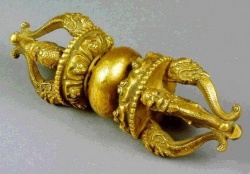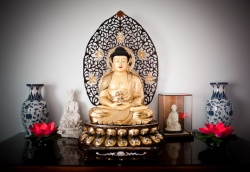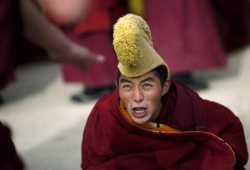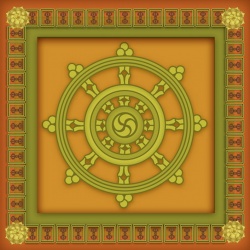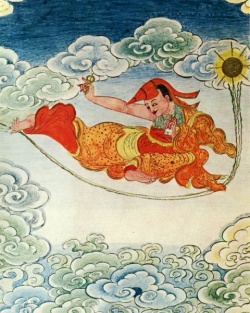Pratimoksha
The Prātimokṣa (Sanskrit: प्रातिमोक्ष Prātimokṣa; Pali: Pāṭimokkha) is a list of rules (contained within the vinaya) governing the behaviour of Buddhist monks (Bhikkhus) and nuns (Bhikkhunis).
Prati means "towards", and mokṣa means liberation from cyclic existence (saṃsāra).
It became customary to recite these rules once a fortnight at a meeting of the sangha during which confession would traditionally take place. A number of prātimokṣa codes are extant, including those contained in the:
- Theravāda Vinaya,
- Mahāsāṃghika Vinaya,
- Mahīśāsaka Vinaya,
- Dharmaguptaka Vinaya,
- Sarvāstivāda Vinaya,
- and the Mūlasarvāstivāda Vinaya.
Prātimokṣa texts may also circulate in separate prātimokṣa sūtras, which are extracts from their respective vinayas.
Overview
The Prātimokṣa belongs to the Vinaya of the Buddhist doctrine and is seen as the very basis of Buddhism.
On the basis of the Prātimokṣa there exist in Mahayana Buddhism two additional set of vows:
The Bodhisattva vows and the Vajrayana vows.
If these two set of vows are not broken, they are regarded as carrying over to future lives.
Texts
The Prātimokṣa is traditionally a section of the Vinaya. The Theravada Vinaya is preserved in the Pali Canon, in the Vinaya Piṭaka section.
The Mūlasarvāstivāda Vinaya is preserved in both the Tibetan Buddhist canon in the Kangyur, in a Chinese edition, and in an incomplete Sanskrit manuscript.
Some other complete vinaya texts are preserved in the Chinese Buddhist canon (see: Taishō Tripiṭaka), and these include:
- Mahīśāsaka Vinaya (T. 1421)
- Mahāsāṃghika Vinaya (T. 1425)
- Dharmaguptaka Vinaya (T. 1428)
- Sarvāstivāda Vinaya (T. 1435)
- Mūlasarvāstivāda Vinaya (T. 1442)
Prātimokṣa in Buddhist traditions
Indian Buddhism
The Dharmaguptaka sect are known to have rejected the authority of the Sarvāstivāda pratimokṣa rules on the grounds that the original teachings of the Buddha had been lost.
Theravada Buddhism
The Patimokkha is the Pali equivalent of Prātimokṣa (Sanskrit).
It is being followed by the monks of the Theravada lineage (Thailand, Sri Lanka, Myanmar, Cambodia and Laos).
It consists of 227 rules for fully ordained monks (bhikkhus) and 311 for nuns (bhikkhunis).
The Patimokkha is contained in the Suttavibhanga, a division of the Vinaya Pitaka.
East Asian Buddhism
Buddhist traditions in East Asia typically follow the Dharmaguptaka Vinaya lineage of the Prātimokṣa, and this is standard for the following Buddhist traditions:
Some traditions of Japanese Buddhism also carry out full monastic ordination, but most Japanese traditions do not. Instead, these traditions of Japanese Buddhism have priests who take Bodhisattva vows, but not full monastic vows (i.e. Prātimokṣa).
The name given to a set of two hundred and twenty seven rules to be observed by members of the Buddhist Order.
The rules are not ethical but mainly economic, regulating the behaviour of the members of the Order towards one another in respect of clothes, dwellings, furniture, etc., held in common.
In four cases out of the two hundred and twenty seven the punishment for infringement of a rule is exclusion from the Order; in all the remaining cases, it is merely suspension for a time.
The Pātimokkha is not included in the extant Buddhist Canon.
The rules are included, in the Sutta Vibhanga ("sutta" here meaning "rule"), which contains besides the rules themselves, an old Commentary explaining them and a new Commentary containing further supplementary information concerning them.
The rules are divided into two parts: one for the monks (Bhikkhu Pātimokkha) and the other for the nuns (Bhikkhuknī Pātimokkha).
It is a moot point whether the rules originally appeared with the explanatory notes (as in the Vibhanga), the Pātimokkha being subsequently extracted, or whether the Pātimokkha alone was the older portion, the additional matter of the Vibhanga being the work of a subsequent revision.
For a discussion of this, see Vin.i. Introd.xvi; Law: Pāli. Lit. 2ff.; Hastings: Encyclopaedia under Pātimokkha.
It is sometimes suggested (Law: op. cit., p.2) that the original number of [[Pātimokkha rules}} numbered only about one hundred and fifty.
A passage in the Anguttara Nikāya (i.231-232) is quoted in support of this suggestion (sādhikam diyaddhasikkhāpadasatam).
According to this theory the seventy five Sekhiyā rules were added later. See Law: op. cit., 19f.;
Law's argument, however, that the Pātimokkha rules were among the texts not recited at the First Council, is due to a wrong understanding of the Sumangala Vilāsinī passage (i.17).
The rules were recited at the gatherings of members of the Order (the Uposatha khandha of the Mahā Vagga (Vin.i.101 36) gives details of the procedure at these gatherings) in their respective districts on uposatha days (the fourteenth and fifteenth days of the month).
Each section of the rules is recited and, at the end of such recital, the reciter asks the members of the Order who are present if any one of them has infringed any of the rules. Silence implies absence of guilt.
This practice of interrupting the recital seems to have been changed later (see Vin.ii.240 ff.) even though the old formula, asking the members to speak, continued as a part of the recital.
The word pātimokkha is variously explained, the oldest explanation being that the observance of the rules is the face (mukham), the chief (pamukham) of good qualities.
The Sanskritised form of the word being prātimoksa, this led to a change in its significance, the completion of the recital being evidence that all those who have taken part are pure in respect of the specified offenses - pātimokkha thus meaning acquittal, deliverance or discharge.
But in most contexts the word simply means code - i.e., code of verses for the members of the Order.
Tibetan Buddhism
The Prātimokṣa of the Mulasarvastavada lineage, followed in Tibetan Buddhism, is taken for the whole life and the vows end when the person who received it died or has broken one or more of the four root vows.
In Tibetan Buddhism, there are eight types of Prātimokṣa vows:
Vows for laity
- Fasting Vows (skt. Upavasa; tib. Nyung ne) — 8 vows
- Laymans' Vows (skt. Upasaka; tib. Genyen) — 5 vows
- Laywomans' Vows (skt. Upasika) — 5 vows
Upasak means 'worshipper' and Upasika 'female worshipper.'
The laywoman and layman Prātimokṣa consists of 5 vows. They are also named as The Five Shilas (skt. moral discipline):
- To refrain from killing.
- To refrain from stealing.
- To refrain from false speech.
- To refrain from sexual misconduct.
- To refrain from using intoxicants.
One is not obliged to take all five vows. The commentaries describe seven types of lay followers:
- Promising to keep just one vow.
- Promising to keep certain vows.
- Promising to keep most of them.
- Promising to keep all five.
- Keeping all five and also promising to keep the pure conduct of avoiding sexual contact.
- Keeping all five, pure conduct, and wearing robes with the promise to behave like a monk or a nun.
- Lay follower of mere refuge. This person is unable to keep the vows but he promises to go for refuge to the triple gem until death.
Vows for monastics
- Male Novices' Vows (skt. Sramanera, tib. Getsul) — 36 vows
- Female Novices' Vow (skt. Sramanerika, tib. Getsulma) — 36 vows
- Probationer Nun's Vows (skt. Siksamana)
- Full Nun's Vows (skt. Bhikshuni, tib. Gelongma) — 364 vows
- Full Monk's Vows (skt. Bhikshu, tib. Gelong) — 253 vows
Only full monks and full nuns are seen as full members of the buddhist monastic order. A group of minimum 4 full ordained is seen as a Sangha.
The Prātimokṣa tells also how to purify faults, how to solve conflicts and deal with all kinds of situations which can happen in the Sangha Community.
See also
Bibliography
Indian Buddhism
- "Buddhist Monastic Discipline: The Sanskrit Pratimoksha Sutras of the Mahasamghikas and Mulasarvastavadins" by Charles S. Prebish, India, Motilal Banarsidass, ISBN 81-208-1339-1
Tibetan Buddhism
- Novice Vows: Lama Mipham's commentary to Nagarjunas "Stanzas for a Novice Monk" together with "Essence of the ocean of Vinaya" by Tsongkhapa ISBN 81-86470-15-8 (LTWA India)
- Full Monk Vows: "Advice from Buddha Sahkyamuni" by HH the 14th Dalai Lama, ISBN 81-86470-07-7 (LTWA India)
- Complete Explanation of the Pratimoksha, Bodhisattva and Vajrayana Vows: "Buddhist Ethics" (Treasury of Knowledge: Book Five), Jamgon Kongtrul Lodro Taye, ISBN 1-55939-191-X, Snow Lion Publications
- Monastic Rites by Geshe Jampa Thegchok, Wisdom Books, ISBN 0-86171-237-4
- Ngari Panchen: Perfect Conduct: Ascertaining the Three Vows, Wisdom Publication, ISBN 0-86171-083-5 (Commentary on the three sets of vows by Dudjom Rinpoche)
